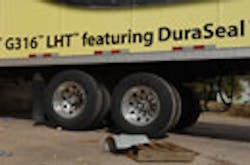Goodyear Tire & Rubber Co. is bringing its DuraSeal self-sealing tire technology to the long-haul truck market via its Unisteel G316 LHT trailer tire. The compound is built into the tire at the time of manufacture and is more effective than aftermarket sealant, the tire-maker said.
DuraSeal’s gel-like, solvent-free compound is built into the inner liner of the tire and can fix punctures up to one-fourth of an inch in diameter, Goodyear said. It has been used for mixed-service applications such as logging, construction and mining since 2005.
“Self-sealing technology in trailer tires is relevant, since maintaining the inner tire of a dual-tire setup is difficult,” said Steve McClellan, vice president of Goodyear commercial tire systems. “Trailers usually are the least-maintained equipment in a fleet’s operation. In addition, with the industry averaging four trailers for each tractor, there’s a greater opportunity for DuraSeal to help long-haul fleets improve productivity,”
Donn Kramer, Goodyear’s director of commercial tire marketing, told Fleet Owner that the driver can get the puncture immediately removed or leave it in until the tire is removed at the terminal. He added that the driver might not even realize that the puncture has occurred.
“Depending on the fleet, some air tire pressure systems would catch the puncture,” he said. “Otherwise you need to visually to check the tires, because you may not know. Usually at ¼ inch you can see them.”
According to Kramer, the sealant is well worth it for fleets that do not have a central location to return to each night. “For decentralized fleets that don’t get back the same day, there is potentially a huge need to provide a lower cost of ownership and prevent downtime,” he said.
“However, if fleets are same-day on-highway service, work in clean yards, and are in and out of the terminal, DuraSeal may not be a benefit,” Kramer added.
DuraSeal tires do not feature sidewall damage protection, but Kramer said that most downtime is related to tread punctures, and the expense can be very steep. “If it costs $500 to $550 for one road call, the trailer would more than pay for itself if it repairs once a year,” he said.
The Unisteel G316 LHT with DuraSeal was introduced earlier this year in response to fleet requests for a DuraSeal trailer tire.